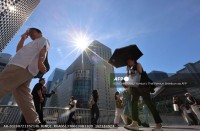Prime Minister David Cameron said early on Friday morning he could see a pathway to a deal to keep Britain in the European Union after speaking at a EU summit dinner in Brussels.
“What I would say is there’s a pathway through this to a deal in February. It’s going to take a lot of hard work, but what I sensed tonight in the room, that there’s a lot of goodwill, there is momentum, people want a deal that keeps Britain in the European Union by giving us that opportunity in our referendum. But a lot has got to be done between now and then,” Cameron said after the dinner.
In his longest address in more than five years of attending EU summits, the conservative leader told the 27 other national leaders over dinner that if they wanted to keep Britain in, they must address his voters’ concerns about curbing immigration.
EU officials said Cameron began his pitch after European Council President Donald Tusk told the summit there was good progress on three of London’s four key demands, but the fourth – to deny EU migrants in-work benefits for four years – was “very difficult”.
While he told reporters he was not backing down on the four-year demand, Cameron also said he was looking for “solutions”.
After telling reporters on arrival he would be “battling for Britain right through the night”, Cameron had a polite discussion that lasted just three hours, finishing shortly before midnight without the kind of “Euro-row” which have been a trademark of British negotiating in Brussels.
“As I say, I’m not saying it’s not hard. This is hard. It is very hard. And it’s going to take a lot of work because it’s not just the welfare that is hard work, if you’re trying to bring together all the changes to make Europe competitive, that is hard work. If you’re trying to make sure that national parliaments can get together and stop legislation, that is hard work. Getting Britain out of ever closer union, it’s all hard work,” Cameron said.
The other leaders around Thursday’s dinner table said they wanted to help Cameron ensure that Europe’s second biggest economy and one of its two top military powers stays in the EU. However, several stressed that a change to EU treaties was out of the question, leaving a binding promise of future change the favoured option. (Reuters)







